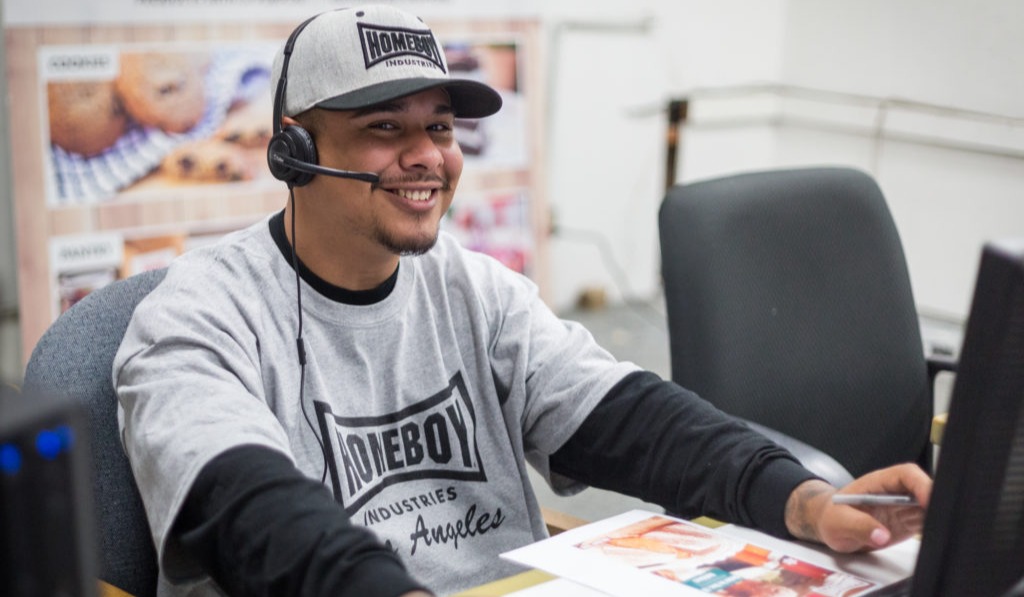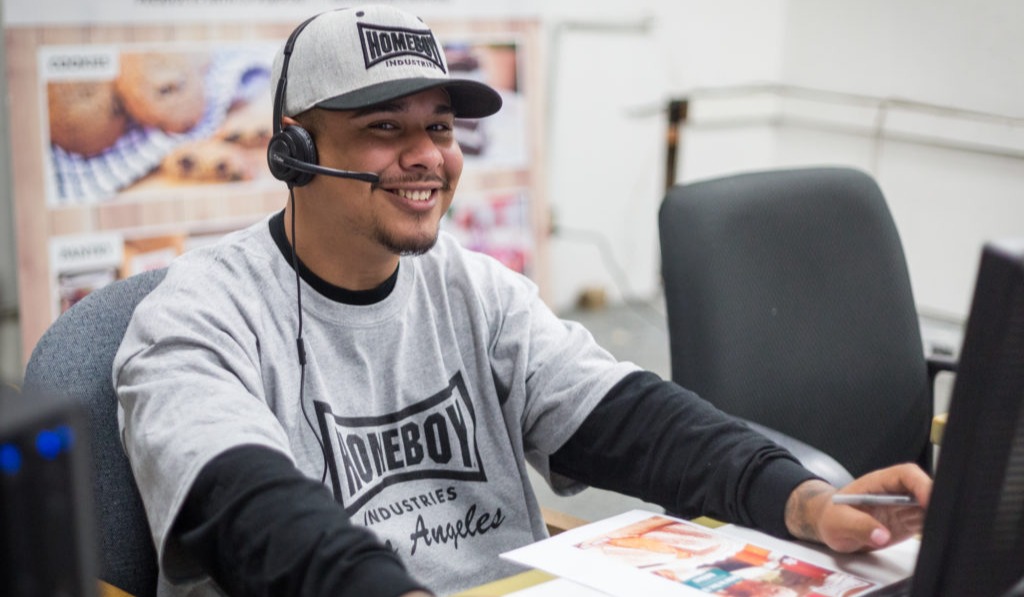Why Social Innovation is the Key to a Healthier Future: A Look at Homeboy Industries

We’ve all heard the familiar song telling us that—“what the world needs now is love.” But, today, it is clear that the world also needs something a little more action-oriented.
This is where social innovation is a key to success, as it is the driver that improves our quality of life and helps fill society with positivity, empathy, compassion, respect for others, and yes, love. In a less philosophical sense, Associate Professor Austin Choi-Fitzpatrick describes social innovation as “Efforts to develop new (or resurrect old!) ways to make the world a more just, equitable and habitable place.”
In this blog, we will explore how social innovation works in non-profits and how Homeboy Industries (a notable nonprofit) has created a healthier future for people worldwide.

How Non-Profits Implement Social Innovation
Behind every social innovation lives a “social entrepreneur”—a person who has identified a need to improve some aspect of life. Such people might take action to upend an unjust system. For example, the U.S. justice system punishes people by putting them in prison rather than focusing on rehabilitation without the idea of punishment, as is done in Switzerland.
Other social entrepreneurs might focus on cultural, environmental, economic or political problems. What’s key is that these people are entrepreneurial, they see opportunities for change where others don’t, and they harness available resources to make things happen. Social entrepreneurs who choose to do their work through a nonprofit organization face special challenges. While government organizations involved in social innovation receive funding based upon taxes collected, and for-profit companies achieve earnings by the sale of products and services, nonprofits must rely on grants, ticket sales from fundraising events, bequests from individuals, and donations.
One of the most successful nonprofit companies in North America is Homeboys Industries. Founded in 1988 by Father Gregory Boyle in Los Angeles, the organization has funded itself for more than three decades and has given thousands of at-risk people a new, more successful way to live.
The Homeboys Industries Story

Homeboy Industries was created in East Los Angeles during the height of the 1980s gang and drug epidemics. At the time, young people in gangs or ex-gang members faced little support from institutions. Homeboy Industries innovated to change that by providing training and career opportunities for gang members to rehabilitate and transform their lives.
Today, they follow a three-part strategy; (1) standing up for the humanity and rehabilitation of gang members; (2) helping them to heal from their own traumas; and (3) investing in their future. They also offer an 18-month job training and reentry program, substance abuse assistance, and other helpful services.
In a time when most communities responded to gang members as simple criminals, Homeboy Industries offered an alternative to the traditional prison and law enforcement answers to gang activity. In 2019 alone, they enrolled 571 former gang members in their 18-month job training program, provided 11,602 gang-affiliated tattoo removal treatments, and sponsored 4,118 therapy sessions.
Homeboy Industries went worldwide in 2014 when it launched The Global Homeboy Network (GHN). Since then, over 400 organizations in 34 states and 20 nations have visited Homeboys headquarters in Los Angeles to learn how to become successful social innovators.
Communities and organizations like Homeboy Industries around the world agree incarceration isn’t the answer to helping underserved people. The company continues to bring people together to work toward social justice, to advocate for marginalized populations, to strive to break the recidivism cycle, and to address the collateral consequences of serving time in prison. The company stands committed to the launch of more community-based organizations and to work to shepherd their growth. In short, Homeboys Industries aims to be a positive alternative to the prison industrial complex in the United States and elsewhere.
Social Innovation for a Healthier World
Nonprofits tend to work on complex problems that often pervade a culture. To solve these problems, social innovators must disrupt existing systems and behaviors. From there, disruption leads to innovation and new solutions where people can enjoy the best possible quality of life—physically, emotionally, financially, spiritually and in safety.
Here are three examples where nonprofits are directly responsible for building a healthier world:
- There can be no issue more pressing than the need to find clean water for drinking, cooking, and personal hygiene. According to ThirstRelief.org, nearly 780 million people worldwide do not have clean water readily available. Social innovator “charity:water” provides clean water sources as a means to improve the health of school-age students and their communities. But not satisfied with providing a source of clean water, charity:water goes several steps further when it provides hygiene training, handwashing instruction, and toilets for students. It has even been recognized that girls in developing countries miss weeks of school or even drop out when they reach puberty because they don’t have a female-only place to use the toilet or wash up at school. charity:water invests in gender-specific bathrooms to improve sanitation. These also have the beneficial effect of improving school attendance, providing privacy, and maintaining dignity for all students.
- Smoking tobacco and vaping often begin during teenage years, which is what led Truth Initiative 21 years ago to launch its campaign against the tobacco industry. Now though, vaping and opioids have also become significant problems that can ruin the lives of teenagers. Today, Truth Initiative has helped more than 300,000 young people take steps to end vaping. For CEO Robin Koval, the most important metric is 3.7—that’s the current percentage of teens who smoke in the U.S. and it’s down from 23% when the company launched in 1999, demonstrating a success in the social innovation field.
- GiveDirectly.org gives cash to the world’s poorest people. “We believe people living in poverty deserve the dignity to choose for themselves how best to improve their lives — cash enables that choice,” the organization says. It has provided more than $400 million directly into the hands of more than 900,000 families in poverty living in Africa and North America. The organization has found that people spend the money they’re given for essentials including medicine; cows, goats, and chickens; school fees; water; solar lights; tin roofs; irrigation; motorcycles to jumpstart taxi services; businesses to generate income; and more. Giving cash directly allows recipients to spend it in the most beneficial ways. These gifts are far more useful than the gift of a goat, of food, or a microloan that needs to be repaid whether the venture is successful or not.
Social innovation takes as many forms as there are countless needs to improve existing systems. What’s your passion? What do you want to change? Your big idea could lead to a social innovation startup that builds a healthier world.
Take the Next Step
Whether you have a clear vision of how you want to solve society’s problems—or if you’re not sure just yet—the Master of Arts in Social Innovation (MASI) can be your passport to changing the world. In the 9-month MASI program, students gain practical skills and experience to develop sustainable, scalable solutions to tackle humanity's urgent challenges, by empowering them to advance their purpose-driven careers, create their own social impact startup, lead innovative programs in an established organization and more.
If you’re not sure about your next steps, download our ebook titled 
Or, if you’re ready to take command, visit our admission page to learn more about the MASI program and apply.

About the Author
The Joan B. Kroc School of Peace Studies (Kroc School) at the University of San Diego is the global hub for peacebuilding and social innovation. Founded in 2007, the Kroc School equips the next generation of innovative changemakers to shape more peaceful and just societies. We offer master's degrees in peace and justice, social innovation, humanitarian action, conflict management and resolution, and a dual degree in peace and law — programs that have attracted diverse and dynamic students from more than 50 countries. In addition to our graduate programs, the Kroc School is home to the Kroc Institute for Peace and Justice (Kroc IPJ). Founded in 2001, the Institute supports positive change beyond the classroom. Through groundbreaking research, experiential learning, and forward-thinking programs, the Kroc School and Kroc IPJ are shaping a future in which peaceful co-existence is the new normal.





